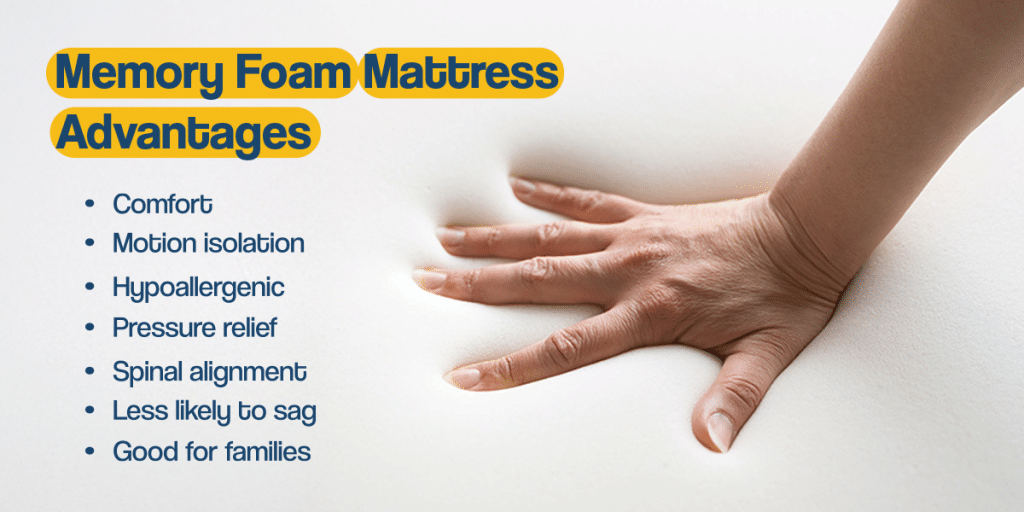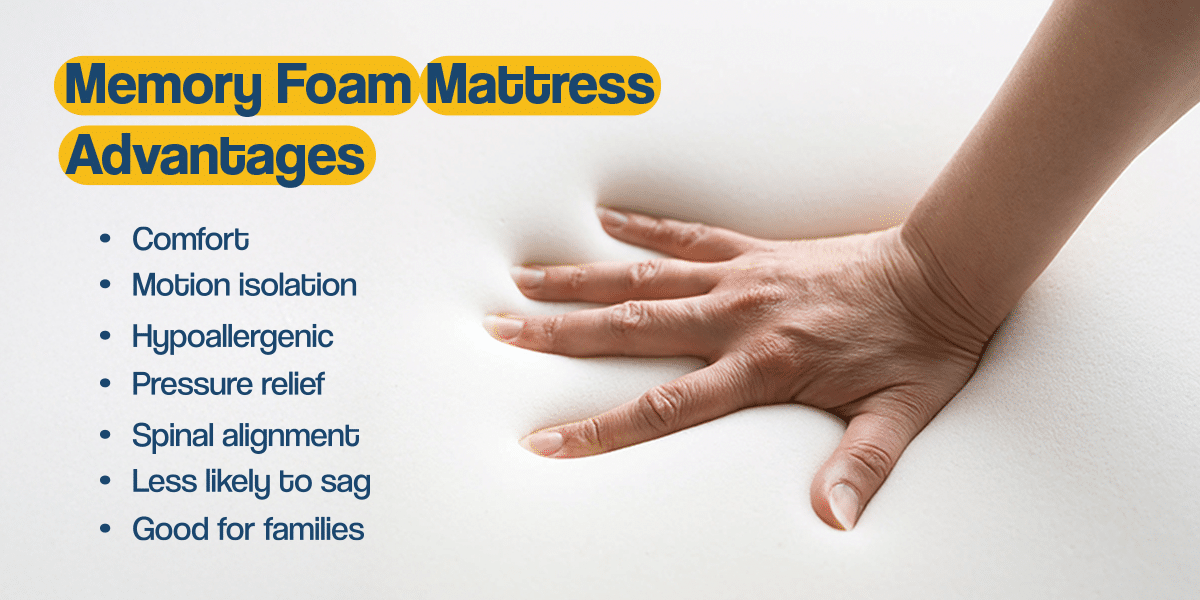
Introduction
Memory foam mattresses have gained immense popularity due to their ability to conform to the body, providing a personalised sleep experience. Whether you’re looking for superior comfort, pressure relief, or enhanced support, memory foam mattresses can offer numerous benefits. However, they also come with certain drawbacks. In this guide, we will explore the memory foam mattress advantages and disadvantages, helping you make an informed decision.
How Memory Foam Mattresses Work?
Memory foam, originally developed by NASA, is designed to contour the body by responding to heat and pressure. When you lie down, the foam softens and moulds to your shape, providing customised support. Once the pressure is removed, the mattress slowly regains its original shape. This adaptive feature offers a unique sleep experience compared to traditional mattresses.
Memory Foam Mattress Advantages
Motion Isolation Benefits
One of the key memory foam benefits is its excellent motion isolation. This means that when one person moves on the bed, their movements are not transferred to the other side. Couples can sleep undisturbed, making memory foam mattresses an ideal choice for those who share a bed.
Back and Spine Support
Memory foam mattresses are designed to evenly distribute body weight, reducing pressure points and promoting spinal alignment. This can be particularly beneficial for individuals suffering from back pain, as it helps maintain a neutral spine position throughout the night.
Durability and Longevity
High-quality memory foam mattresses, such as those from Centuary Mattress, are built to last. With proper care, they can retain their shape and performance for up to 8-10 years. Their durable materials resist sagging, ensuring consistent support and comfort over time.
Memory Foam Mattress Disadvantages
Heat Retention Issues
One of the most common memory foam mattress disadvantages is heat retention. The dense structure of memory foam can trap body heat, leading to discomfort, especially for hot sleepers. However, newer models, such as those offered by Centuary Mattress, incorporate cooling technologies like gel-infused foam and breathable covers to mitigate this issue.
Price Concerns
Compared to traditional spring mattresses, memory foam mattresses tend to be more expensive. Advanced materials and construction methods contribute to higher price points. However, investing in a high-quality mattress like the Centuary Mattress ensures long-term benefits in terms of comfort and durability.
Factors to Consider When Buying a Memory Foam Mattress
Firmness Level
Memory foam mattresses come in different firmness levels, ranging from soft to firm. Choosing the right firmness depends on your sleep position and personal preference. Side sleepers may prefer a softer mattress, while back and stomach sleepers might need a firmer option for better support.
Density
The density of the memory foam affects its durability and support. Higher-density foams provide better support and longevity, while lower-density options are softer and more affordable. The Centuary Mattress collection offers a variety of density options to cater to different needs.
Cooling Features
To combat heat retention, look for memory foam mattresses with cooling features such as gel-infused foam, open-cell technology, or moisture-wicking covers. These features help regulate temperature and provide a cooler sleeping experience.
Budget
Set a budget before shopping and compare different options within your price range. While premium memory foam mattresses come with a higher price tag, they often provide better durability and comfort in the long run.
Warranty and Trial Period
A good warranty and trial period can give you peace of mind when purchasing a memory foam mattress. Reputable brands like Centuary Mattress offer extended warranties and sleep trials to ensure customer satisfaction.
Conclusion
Memory foam mattresses offer exceptional comfort, pressure relief, and motion isolation, making them a popular choice for many sleepers. However, it’s essential to consider potential drawbacks such as heat retention and cost before making a purchase. By evaluating factors like firmness, density, and cooling features, you can find the perfect memory foam mattress to suit your needs.
FAQs
Yes, memory foam mattresses are good for your back as they provide excellent support by conforming to the body’s natural curves. They help maintain spinal alignment and reduce pressure points, which can alleviate back pain and promote better sleep posture.
The lifespan of a memory foam mattress depends on its quality and usage. High-quality options like Centuary Mattress can last between 8-10 years with proper care, while lower-quality mattresses may wear out sooner.
To reduce heat retention, opt for a memory foam mattress with cooling technologies such as gel-infused foam, breathable covers, or open-cell structures. Additionally, using breathable bedding and maintaining a cool room temperature can enhance comfort.
Memory foam can be suitable for stomach sleepers if they choose a firmer mattress. A firmer memory foam mattress helps prevent excessive sinking, keeping the spine aligned and reducing the risk of back or neck strain.

